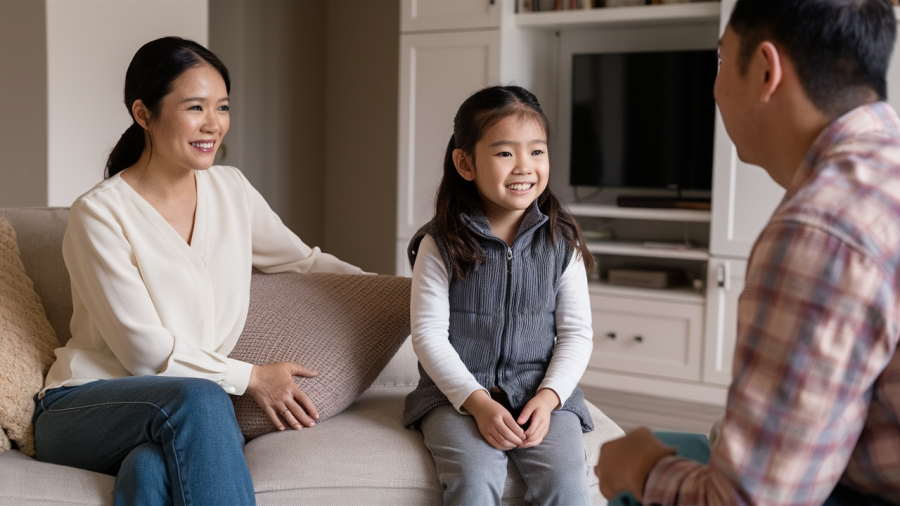In the midst of a forest, there was a raven who felt lonely and longed for connection with the other small animals around him.
“If you don’t change yourself, then going anywhere else is meaningless,” advised the dove. After this, the raven began to introspect deeply.
This is the “Raven’s Law” – when life gets challenging, change needs to start from within, not from others.
As parents age, many long for harmony and to live with their children. According to the “Raven’s Law,” for children to feel the love and significance of family bonds, parents also need to learn to integrate and become companions for their children.
Whether parents are looking at themselves or their children, they need to know how to leverage their strengths and minimize their weaknesses to promote positive relationship growth.

For parents, it’s crucial to focus on their strengths and weaknesses to foster positive relationships with their children.
Harmonious communication is key to befriending your child
An ancient proverb states, “Speech can create both right and wrong.”
This is an important reminder of the balance between speaking and listening. Sometimes, our excessive words can obscure the truth and lead to misunderstandings.
This is especially prominent in the parent-child relationship. While parents always want the best for their children and desire to share their experiences, if they don’t know how to listen and communicate reasonably, their words can become meaningless nagging, or even cause conflict and disharmony.
As the world undergoes rapid changes, the experiences of the previous generation may not align with the new one. Therefore, parents need to develop their listening, observation, and empathy skills rather than just imposing their views. This is the art of communicating with and educating children.
When parents learn to be silent when necessary, pay attention to their children’s development and the societal shifts, and only share essential messages, family relationships become more peaceful. Children tend to listen and absorb more willingly in this atmosphere.

Parents need to listen, observe, and empathize with their children to create a peaceful family atmosphere.
Focus on strengths instead of criticizing weaknesses
Aesop’s fable of the raven offers a profound message about the value of inner nature rather than just outward appearances. The raven’s story reminds us that a person’s truth lies in their inner qualities, not just transient beauty.
The tale of the raven’s desire to become king of the birds teaches a profound lesson. To achieve this, it adorned itself with colorful feathers from other birds. When Zeus saw its magnificent form, he decided to bestow royalty upon the raven.
However, when the truth was revealed, the other birds quickly realized the deception and plucked off the fake feathers. The story concludes with the message that “although we may create an illusion of beauty with others’ help, ultimately, the glamorous disguise will be unraveled.”
The story’s message is profound, emphasizing that we shouldn’t judge people by their outward appearances but should instead value their inner nature and substance.
Unfortunately, many parents focus only on superficial achievements, neglecting to appreciate other valuable qualities like diligence, responsibility, or courage. This causes them to miss the wonderful potential hidden in their children.
On the other hand, if parents broaden their perspective and pay attention to the “eyes and wisdom” of each individual, instead of just their outward appearance, they will have the opportunity to discover surprising and valuable aspects of their children.
The story of the raven is not just entertaining; it also conveys a profound message. Through creativity and perseverance, an ordinary creature can overcome challenges and find unexpected solutions.

By focusing on their children’s unique strengths and perspectives, parents can discover their true potential.
Teach your children gratitude
Gratitude is a dynamic exchange, not just an expectation from the older generation but also a concern for the younger one.
When parents are healthy, they can help care for their grandchildren and perform household chores. Conversely, when parents have difficulty moving, their children will be their caring companions.
Teaching children gratitude is a crucial task. Gratitude is not just an emotion but a habit that should be cultivated from an early age. When children are guided to appreciate the little things in life, they grow up with a positive mindset and gratitude for what they have.
Parents should encourage children to express gratitude by saying “thank you” whenever they receive help, whether from family or others. Additionally, create opportunities for them to show appreciation through activities like writing thank-you letters or making gifts for those who have helped them.
Moreover, parents are the mirrors that reflect what they wish to see in their children. When parents naturally express gratitude in their daily lives, children will easily emulate this behavior. This is one of the most effective ways to nurture positive qualities in children, ensuring they grow up with a sense of respect and appreciation for their parents’ love and sacrifices.






































